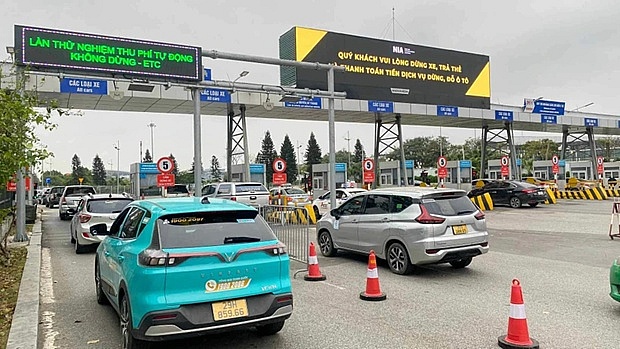Non-stop toll collection to be officially applied in five airports from May 5
 |
| Non-stop toll collection has been piloted at the Noi Bai International Airport since February 6. (Photo: VNA) |
Hanoi - The electronic toll collection (ETC) system will be officially and simultaneously implemented at five airports namely Noi Bai, Cat Bi, Phu Bai, Da Nang and Tan Son Nhat from May 5, aiming to create more favourable conditions for vehicles entering and exiting the airports, according to the Airports Corporation of Vietnam (ACV).
The system was piloted initially at the two largest airports in the country - Noi Bai International Airport in Hanoi and and Tan Son Nhat International Airport in Ho Chi Minh City - and then at three additional airports, namely Cat Bi in northern Hai Phong city, Phu Bai in central Thua Thien-Hue province and central Da Nang city.
The ACV said that it will install the ETC system at T3 terminal of the Tan Son Nhat airport and expanded T2 terminal of the Noi Bai airport, which are under construction, thus preventing traffic congestion.
Cars that already have ETC tags to use on highways and expressways can travel through the airports’ toll lane without requiring any additional tags or procedures.
During the pilot period from February 6 to March 19, as many as 203,606 vehicles passed through the ETC lane at Noi Bai and 132,926 through the lane at Tan Son Nhat.
The ACV said that the system has operated stably, ensuring smooth movement of vehicles even during the peak travelling season during the Lunar New Year (Tet) Festival.
The rate of vehicles successfully paying with ETC cards through the non-stop toll test lanes was about 90 per cent. The number of vehicles passing through the non-stop toll lanes was 1.8 times higher than the number of vehicles passing through the traditional toll lane, significantly reducing congestion at the exit.
Currently, Vietnam has nearly 5 million cars, 96 per cent of which have had ETC tags and accounts.
After applying the ETC system at the airports, the Ministry of Transport plans to install the system for seaport, parking, insurance, and vehicle technical checking services.
What the stars mean:
★ Poor ★ ★ Promising ★★★ Good ★★★★ Very good ★★★★★ Exceptional
Related Contents
Latest News
More News
- Tet event in Japan celebrates success of 14th National Party Congress (January 25, 2026 | 10:04)
- 14th National Party Congress wraps up with success (January 25, 2026 | 09:49)
- Congratulations from VFF Central Committee's int’l partners to 14th National Party Congress (January 25, 2026 | 09:46)
- List of newly-elected members of 14th Political Bureau announced (January 23, 2026 | 16:27)
- 14th Party Central Committee unanimously elects To Lam as General Secretary (January 23, 2026 | 16:22)
- List of members of 14th Party Central Committee announced (January 23, 2026 | 09:12)
- Highlights of fourth working day of 14th National Party Congress (January 23, 2026 | 09:06)
- Press provides timely, accurate coverage of 14th National Party Congress (January 22, 2026 | 09:49)
- Press release on second working day of 14th National Party Congress (January 22, 2026 | 09:19)
- Minister sets out key directions to promote intrinsic strength of Vietnamese culture (January 22, 2026 | 09:16)

 Tag:
Tag:




















 Mobile Version
Mobile Version